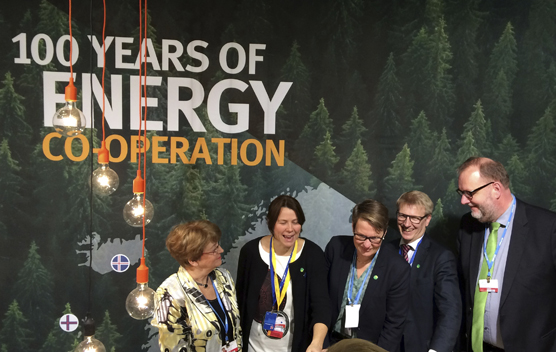Press release 2016-05-02 at 10:37
The historic global climate agreement, the “Paris Agreement” was opened for signature on the 22nd of April 2016. The negotiations on the implementation of the agreement start in May. These negotiations will be crucial for meeting the ambitious objectives of the agreement. A recent study finds that increased cooperation between countries and decreased mitigation costs resulting from enhanced policy can help to achieve the current contributions and also increase the ambition of future targets.

Ministers from the Nordic countries in Paris December 2015. Photo Hanna-Liisa Kangas.
The Paris Agreement starts a new era in global climate policy. Although 188 countries, covering over 95 percent of global emissions, have already submitted their first unilateral contributions, the Parties’ initial contributions are not sufficient for achieving the target of keeping the temperature increase well below 2 °C as set out in the agreement.
“The insufficiency of the voluntary contributions is not a surprise, this has been predicted in environmental economics studies. However, looking at the history of climate negotiations and the political ambience, the current approach seems to be the only politically feasible way to proceed”, says Dr Hanna-Liisa Kangas, Senior Researcher of the Finnish Environment Institute.
To achieve the Paris Agreement mitigation targets, countries’ contributions need to become more ambitious in the years to come. This requires strengthening of existing policies and implementing additional and enhanced policies to increase climate change mitigation.
“In this report our attempt was to bridge the realities of climate negotiations and theoretical understanding of the ways to increase the global climate mitigation ambition in the Paris Agreement framework. According to our extensive literature review, the main drivers that could boost climate change mitigation ambition in the implementation include decreasing policy uncertainty, increasing solidarity and trust between parties, lower costs of low-carbon investments, and improving transparency of mitigation targets and actions”, says Kangas.
The Paris Agreement itself is a significant step towards more ambitious global climate policy. However, the implementation of the agreement will determine how well its objectives are met. Upcoming negotiations can help to shape future climate policy design towards a positive cycle of increasing climate change mitigation ambition.
“Our study shows that good implementation requires increased multi-level cooperation between Parties, a trustworthy review process and international market and non-market mechanisms and instruments. Also enhanced technology transfer and information sharing, as well as the scaling up of new low-carbon finance instruments are important”, says Kangas.
The study is a collaboration project of Finnish Environment Institute SYKE and Institute for Economic Research VATT. The study is financed by the Finnish Ministry of the Environment.
More information
Senior Researcher, Dr Hanna-Liisa Kangas, Finnish Environment Institute SYKE,
tel. +358 (0) 50 377 5020, firstname.lastname@ymparisto.fi
Report and Executive Summary for Policy Makers